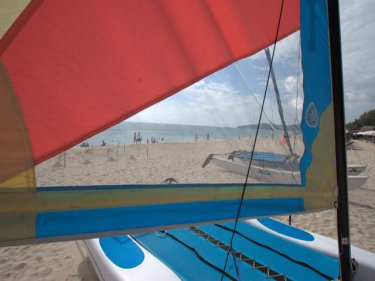RESORT managers in Phang Nga are irate about a sudden tax increase that has doubled the local Orborjor council levy on room revenue from one percent to two percent, effective almost immediately.
The sudden sharp rise puts Phang Nga's tax at twice that of neighboring Phuket, and it also leaves the up-and-coming ''green'' tourist province at a distinct disadvantage when compared to other places in Thailand where no such local tax exists.
The tax has always been controversial. Phuketwan sought a comment today from the Phang Nga Orborjor but no officials were available - it's the council's annual sports day.
The likelihood is that the well-known resort brands in Phang Nga will be forced to pay the tax and absorb the increase, while many smaller hotels will continue to ignore it. This is also the pattern on Phuket.
The letter, asking for payment before February 10, arrived at one Khao Lak resort on December 20. Other resort managers were still discovering the unpleasant surprise in their in-trays today.
''What it effectively means for us is a sudden increase in tax of 1.8 million baht to two million baht,'' one resort manager told Phuketwan.
''In normal circumstances we would have to pass it on to guests. But we cannot, because the contracts with our business partners are already set.''
Larger resorts will face a much greater impost. ''It just makes Khao Lak more expensive than Phuket, which is ridiculous,'' the manager said.
A second manager at a larger resort hunted down the letter in the resort and called back to Phuketwan to express his indignation.
''We try to do everything by the book and we do not wish to be viewed in a bad light,'' he said. ''But this is incredible.''
The manager said that resorts had held talks with the Phang Nga Orborjor about ways the council could help to attract tourists and about improvements to tourist safety. The council had shown no signs of action.
''We even raised the prospect of holding the Ironman event here but that went to Phuket,'' the manager said. ''We have also asked the council to make the three-lane through the centre of Khao Lak safer for pedestrians, but nothing has happened.
''We have suggested the council looks at making Khao Lak disabled-friendly as a destination. Again, nothing has happened.''
A third manager said he had yet to sight the letter, but added: ''If it's the law, I guess we will have no choice except to pay it.''
A spokesman for the Thai Hotels Association on Phuket said there was nothing to indicate at this stage that an increase from the present one percent tax was planned for Phuket.
In Phang Nga, the rate of council tax has risen from 0.5 percent in 2008 to 0.75 percent in 2009, to one percent in 2010 and now to two percent in 2011.
''This is straight off the bottom line,'' the first manager said. ''In addition, Khao Lak will be one percent less competitive on room rate. Twelve months' notice would enable us to pass on the charge, 12 days' notice makes this impossible.
''In addition, our 2011 budget have already been approved by our board and shared with our bank.
''What justification can there be for Phang Nga to charge double all other provinces that charge? I understand that Bangkok, Hua Hin and maybe Samui do not have a provincial tax.''
Phuketwan was unable to contact an Orborjor spokesperson to ask how the council planned to spend the large sum that it will receive from the 100 percent tax increase, or whether it plans to pursue non-payers.
The sudden sharp rise puts Phang Nga's tax at twice that of neighboring Phuket, and it also leaves the up-and-coming ''green'' tourist province at a distinct disadvantage when compared to other places in Thailand where no such local tax exists.
The tax has always been controversial. Phuketwan sought a comment today from the Phang Nga Orborjor but no officials were available - it's the council's annual sports day.
The likelihood is that the well-known resort brands in Phang Nga will be forced to pay the tax and absorb the increase, while many smaller hotels will continue to ignore it. This is also the pattern on Phuket.
The letter, asking for payment before February 10, arrived at one Khao Lak resort on December 20. Other resort managers were still discovering the unpleasant surprise in their in-trays today.
''What it effectively means for us is a sudden increase in tax of 1.8 million baht to two million baht,'' one resort manager told Phuketwan.
''In normal circumstances we would have to pass it on to guests. But we cannot, because the contracts with our business partners are already set.''
Larger resorts will face a much greater impost. ''It just makes Khao Lak more expensive than Phuket, which is ridiculous,'' the manager said.
A second manager at a larger resort hunted down the letter in the resort and called back to Phuketwan to express his indignation.
''We try to do everything by the book and we do not wish to be viewed in a bad light,'' he said. ''But this is incredible.''
The manager said that resorts had held talks with the Phang Nga Orborjor about ways the council could help to attract tourists and about improvements to tourist safety. The council had shown no signs of action.
''We even raised the prospect of holding the Ironman event here but that went to Phuket,'' the manager said. ''We have also asked the council to make the three-lane through the centre of Khao Lak safer for pedestrians, but nothing has happened.
''We have suggested the council looks at making Khao Lak disabled-friendly as a destination. Again, nothing has happened.''
A third manager said he had yet to sight the letter, but added: ''If it's the law, I guess we will have no choice except to pay it.''
A spokesman for the Thai Hotels Association on Phuket said there was nothing to indicate at this stage that an increase from the present one percent tax was planned for Phuket.
In Phang Nga, the rate of council tax has risen from 0.5 percent in 2008 to 0.75 percent in 2009, to one percent in 2010 and now to two percent in 2011.
''This is straight off the bottom line,'' the first manager said. ''In addition, Khao Lak will be one percent less competitive on room rate. Twelve months' notice would enable us to pass on the charge, 12 days' notice makes this impossible.
''In addition, our 2011 budget have already been approved by our board and shared with our bank.
''What justification can there be for Phang Nga to charge double all other provinces that charge? I understand that Bangkok, Hua Hin and maybe Samui do not have a provincial tax.''
Phuketwan was unable to contact an Orborjor spokesperson to ask how the council planned to spend the large sum that it will receive from the 100 percent tax increase, or whether it plans to pursue non-payers.
More News from Phuketwan
Phuket Governor Reassures Tourists over Tsunami Tip
Latest Predictions of a tsunami have led to Phuket's governor issuing a statement citing the precautions now being taken to provide adequate warnings in the unlikely event of another big wave.
Phuket Governor Reassures Tourists over Tsunami Tip
Two Patong Wrong-Way Streets to Go One-Way
Latest January 15 has been set as the date for a start to be made to traffic changes in Patong. On that day, two wrong way connecting streets will become one way. Parking is changing, too.
Two Patong Wrong-Way Streets to Go One-Way
Fake Phuket Watch Pair Doing Time Soon
Latest Tourists' complaints about copy watches that were not sold as copy watches but as genuine items have led to a police raid on Phuket and the arrest of two Vietnamese men.
Fake Phuket Watch Pair Doing Time Soon
Four Bidders Want to Run Phuket's New Hospital
Latest Private but low cost, Phuket's new hospital aims to give local people an alternative and relieve the pressure for bed space at Phuket's largest public hospital.
Four Bidders Want to Run Phuket's New Hospital





Too bad this isn't phangngawan.com
Slow day in Phuket news?
Posted by Glen on December 23, 2010 14:41
Editor Comment:
For us, Glen, Phuket is only a part of life. If you think it's all there is, you're in trouble.